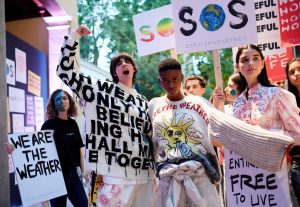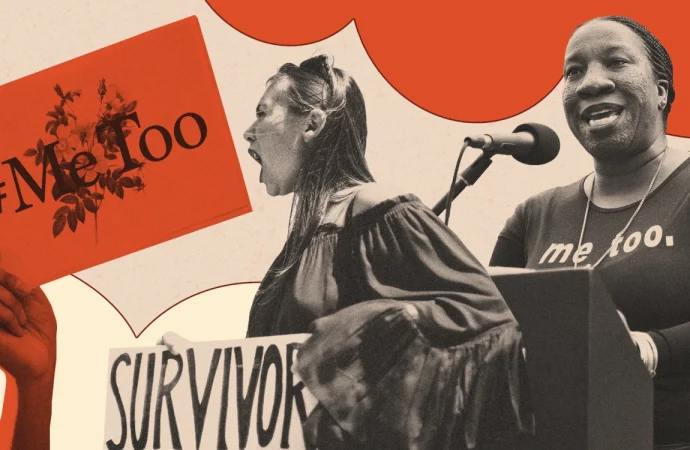Introduction In the 21st century, the confluence of celebrity activism and pop culture has become a potent force in shaping public opinion, social norms, and even political landscapes. This article delves into the intricate relationship between celebrity activism and pop culture, examining how celebrities leverage their influence to effect change and how this, in turn,
Introduction
In the 21st century, the confluence of celebrity activism and pop culture has become a potent force in shaping public opinion, social norms, and even political landscapes. This article delves into the intricate relationship between celebrity activism and pop culture, examining how celebrities leverage their influence to effect change and how this, in turn, transforms the cultural zeitgeist.
The Rise of Celebrity Activism

Image by: Google.com
Celebrity activism is not a novel phenomenon. Historically, public figures have used their platforms to advocate for various causes. However, the digital age has amplified their reach and impact exponentially. Social media platforms like Twitter, Instagram, and TikTok allow celebrities to communicate directly with millions of followers, bypassing traditional media gatekeepers.
- Historical Context
From Audrey Hepburn’s humanitarian work with UNICEF to Muhammad Ali’s outspoken stance against the Vietnam War, celebrities have long been involved in activism. However, the scale and immediacy of modern celebrity activism are unprecedented. The advent of the internet and social media has democratized information dissemination, enabling celebrities to mobilize public opinion quickly and effectively.
- Modern Examples
In recent years, figures like Leonardo DiCaprio, Emma Watson, and Colin Kaepernick have become synonymous with activism. DiCaprio’s environmental advocacy, Watson’s feminism and gender equality campaigns, and Kaepernick’s stance against racial injustice exemplify how celebrities use their platforms to promote social change.
Social Movements Powered by Celebrity Influence
Celebrities play a crucial role in promoting social movements, both raising awareness and influencing public perception. Movements like #MeToo and Black Lives Matter gained widespread visibility due to endorsements from A-list personalities. When stars like Oprah Winfrey, Beyoncé, and Lady Gaga speak out, their messages resonate across social, economic, and demographic boundaries.
By aligning with movements, celebrities also lend credibility and a sense of urgency to causes. Their status as public figures adds emotional weight, encouraging others to join in the advocacy. In this way, celebrity activism becomes a form of cultural soft power, influencing not just fans but also policymakers.
The Mechanisms of Influence

Image by: Google.com
- Social Media as a Tool
Social media is the linchpin of modern celebrity activism. Platforms like Twitter and Instagram provide celebrities with a direct line to their audience, allowing them to share information, mobilize support, and raise awareness for various causes. The hashtag culture, epitomized by movements like MeToo and BlackLivesMatter, illustrates how social media can galvanize public opinion and drive real-world action.
- Collaborations and Partnerships
Celebrities often collaborate with non-profit organizations, brands, and other public figures to amplify their messages. These partnerships can take various forms, from fundraising campaigns and public service announcements to advocacy events and merchandise sales. Such collaborations not only raise awareness but also generate substantial financial support for various causes.
- Media Coverage
Traditional media outlets continue to play a significant role in amplifying celebrity activism. News coverage, interviews, and feature articles provide additional platforms for celebrities to discuss their causes. This symbiotic relationship between celebrities and the media ensures that their activism reaches a broader audience.
The Cultural Shift Towards Activism in Entertainment
The entertainment industry has seen a cultural shift in which activism is no longer just a side endeavor but has become part of a celebrity’s personal brand. From promoting gender equality to championing LGBTQ+ rights, modern celebrities integrate advocacy into their public personas, influencing how audiences view these issues.
Streaming platforms like Netflix and Amazon Prime are reflecting this shift, with films and series that tackle social justice themes becoming mainstream. The incorporation of activism into entertainment has widened discussions on issues such as racial diversity, climate change, and women’s rights. Movies, music, and television are now more likely to include narratives that push for societal progress, all driven by celebrity influence.
The Impact on Pop Culture

Image by: Google.com
- Shaping Public Discourse
Celebrity activism profoundly influences public discourse. When a high-profile figure speaks out on an issue, it often becomes a topic of widespread discussion. This phenomenon can be seen in the increased visibility of issues like climate change, gender equality, and racial justice, which have been championed by various celebrities.
- Fashion and Lifestyle
Celebrity activism also permeates fashion and lifestyle trends. Sustainable fashion, for instance, has gained traction partly due to endorsements from celebrities like Emma Watson and Stella McCartney. Similarly, veganism and plant-based diets have been popularized by celebrities such as Beyoncé and Joaquin Phoenix.
- Entertainment Industry
The entertainment industry itself is not immune to the influence of celebrity activism. Films, music, and television shows increasingly reflect the social issues championed by celebrities. For example, the success of socially conscious films like “12 Years a Slave” and “Parasite” indicates a growing appetite for content that addresses pressing societal issues.
The Role of Social Media in Celebrity Activism
Social media has democratized activism, allowing celebrities to act as direct channels between causes and their audience. Platforms like Twitter, Instagram, and TikTok give celebrities instant access to millions of followers, transforming social issues into viral trends. Social media campaigns, like the #FreeBritney movement or climate protests led by stars, gain momentum faster than traditional media ever could.
However, the nature of social media also means that activism can be fleeting. The same platforms that amplify social causes also foster short attention spans, making it difficult to sustain prolonged engagement. Still, the power of a single tweet or post from a prominent figure cannot be underestimated in its ability to shape pop culture narratives.
Criticisms and Challenges

Image by: Google.com
- Authenticity and Performative Activism
One of the primary criticisms of celebrity activism is the question of authenticity. Critics argue that some celebrities engage in “performative activism,” where their involvement is more about enhancing their public image than effecting real change. This skepticism is often fueled by instances where celebrities fail to follow through on their commitments or exhibit a lack of depth in their understanding of the issues they champion.
- Impact on Grassroots Movements
Another criticism is that celebrity activism can overshadow grassroots movements. While celebrities can bring significant attention to a cause, their involvement can sometimes marginalize the efforts of activists who have been working on these issues for years. This dynamic can create a dependency on celebrity endorsement, potentially undermining the sustainability of grassroots activism.
- Economic Disparities
The economic disparities between celebrities and the general public can also complicate their activism. While celebrities have the financial resources to support various causes, their privileged positions can sometimes make their advocacy seem out of touch with the realities faced by ordinary people.
Celebrity Activism and Brand Collaborations
An emerging trend within celebrity activism is the collaboration between public figures and brands to promote social causes. Many companies have recognized the power of celebrity influence and are partnering with stars to advocate for sustainability, diversity, and other pressing issues. For example, Serena Williams has aligned with Nike to support initiatives that promote gender equality in sports. These collaborations allow celebrities to integrate activism into consumer culture, encouraging fans to engage with both the products and the causes they represent.
However, this blending of activism and commercial partnerships has sparked debate over the authenticity of celebrity-driven social campaigns. Critics argue that aligning with corporate entities may dilute the sincerity of the message, as companies may prioritize profits over genuine social impact. Nonetheless, for fans, these partnerships provide an opportunity to participate in activism through everyday consumer choices, potentially broadening the reach and impact of important social movements.
The Future of Celebrity Activism and Pop Culture
As we move forward, it is likely that celebrity activism will continue to play a significant role in shaping pop culture. The lines between entertainment and advocacy will blur even further as more celebrities integrate social justice into their professional identities. With the rise of virtual influencers and artificial intelligence, even the future of activism may see new, tech-driven faces.
Nevertheless, the influence of celebrity activism on pop culture remains an evolving landscape, with its potential for both positive social change and the risk of commodifying serious issues. Whether this trend deepens or fades will depend on how effectively celebrities can balance their advocacy with genuine commitment and sustained action.
Analysis of Modern Celebrity Activism
| Key Factor | Impact on Pop Culture | Example |
| Social Media Reach | Amplifies causes globally | Greta Thunberg’s climate activism |
| Celebrity Brand Equity | Enhances issue visibility | Leonardo DiCaprio’s environmental work |
| Audience Engagement | Direct fan mobilization | Rihanna’s philanthropy via Fenty Beauty |
| Media Representation | Cultural narrative shift | Black Lives Matter and Hollywood’s support |
Comparative Table: Traditional vs. Celebrity-Led Activism
| Aspect | Traditional Activism | Celebrity-Led Activism |
| Reach | Limited to local/national media coverage | Global through social media platforms |
| Time to Mobilize | Often slow, requires grassroots effort | Immediate mobilization via fanbases |
| Emotional Influence | Relies on intellectual persuasion | Relies on personal attachment to stars |
| Media Influence | Dependent on press coverage | Driven by celebrity news cycles |
| Long-term Impact | Focused on sustained grassroots efforts | May face volatility, often issue-specific |
Conclusion
Celebrity activism is a multifaceted phenomenon that wields considerable influence over pop culture. By leveraging their platforms, celebrities can raise awareness, mobilize support, and drive social change. However, the effectiveness and authenticity of their activism are subjects of ongoing debate. As the landscape of celebrity activism continues to evolve, its impact on pop culture will undoubtedly remain a topic of significant interest and scrutiny.
In summary, the intersection of celebrity activism and pop culture is a powerful force that shapes societal norms and values. While it offers numerous opportunities for positive change, it also presents challenges that need to be navigated carefully. As we move forward, the role of celebrities in activism will likely continue to be a dynamic and influential aspect of our cultural landscape.
















